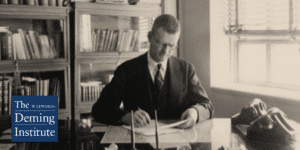John Hunter
By John Hunter, founder of CuriousCat.com. I suggest reading this excellent paper on Improving Problem Solving by Ian Bradbury and Gipsie Ranney. As they note, problem solving is not a substitute for innovation and improvement as solving a problem solving only returns you to the status quo. The paper also considers the relationship between problem […]
Read MoreBy John Hunter, author of the Curious Cat Management Improvement Blog (since 2004). Clayton Christen takes look at the macro-economic impacts of innovation in this lecture at Oxford University. He discusses disruption innovation (creating new markets for complex expensive products: for example, from mainframe computer to personal computer to smart phone), sustaining innovation and efficiency […]
Read MoreBy John Hunter, founder of CuriousCat.com. From The Essential Deming, What Ought a School of Business Teach? by Dr. Deming I carried out a study at New York University School of Business. The Dean of the school, at that time, came to me about 1972 and suggested we carry out a study of students that […]
Read MoreBy John Hunter, author of the Curious Cat Management Improvement Blog (since 2004). Dr. Deming would start his seminars with a quote that set the tone for the seminar: We are here “To have fun, To learn, and To Make a Difference.” In that statement you can see the importance Deming placed on knowledge, effectiveness […]
Read MoreBy John Hunter, founder of CuriousCat.com. Bill Bellows asks the question “How did we do on the test?” not “How did you do on the test?” Seeing that the student is partially responsible for their learning but that the teacher and the learning system provided by the school are inputs that will set the student […]
Read MoreBy John Hunter, author of the Curious Cat Management Improvement Blog (since 2004). The aim proposed here for any organization is for everybody to gain – stockholders, employees, suppliers, customers, community, the environment – over the long term. W. Edwards Deming describing the purpose of an organization in The New Economics, page 51 When you […]
Read MoreBy John Hunter, founder of CuriousCat.com. Jan 24 1989 – first presentation of Deming’s “System of Profound Knowledge” Knowledge of variation; statistical theory Knowledge of the distinction between common causes and special causes Knowledge about the loss from tampering Knowledge about the interaction of forces Knowledge of operational definitions Knowledge psychology Knowledge of cooperation and […]
Read MoreBy John Hunter, author of the Curious Cat Management Improvement Blog (since 2004). An enumerative study is focused on judgment of results. These studies are meant to enumerate (explain, evaluate, describe) the condition that exists with the existing population. On the other hand, an analytic study is focused on improvement of the process which created […]
Read MoreBy John Hunter, founder of CuriousCat.com. Dr. Deming’s included the the theory of knowledge (how do we know that what we “know” is so) as one of the four inter-related components of his management system. How to apply an understanding of the theory of knowledge within the management system for their organization often gives people […]
Read MoreBy John Hunter, author of the Curious Cat Management Improvement Blog (since 2004). Incomplete communication often creates problems. You often don’t have to ask why 5 times to figure out the weaknesses in communication that lead to trouble. Over and over again, most organizations find problems were created, or grew, because someone that could have […]
Read More


